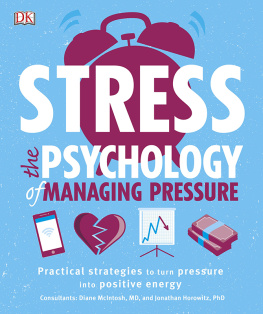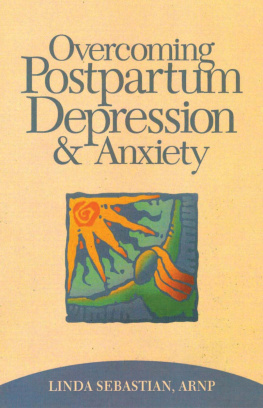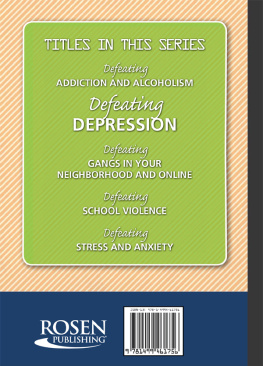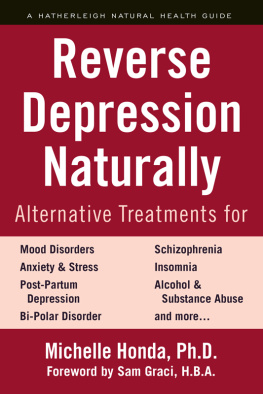Praise for This Is Depression
Dr. Diane McIntosh has achieved the impossible with this book: she enables everybody to understand depression in a highly readable way. As someone who has suffered from depression, I empathize deeply with Dr. McIntoshs narrative. She combines real-life stories with academic rigour to bring clarity and insight to this debilitating disease. Whether youre a sufferer or a caregiver, This Is Depression will be an indispensable guide to understanding and ultimate healing.
Mike Lipkin, motivator and coach, Environics/Lipkin
This book provides balanced and complete information in an easy-to-understand way. Dr. McIntosh cares so passionately about people living with mental illness and offers clear information and optimism. Mental illness does not discriminate; anyone living with mental illness or who cares for someone living with mental illness should read this book.
Allison Rosenthal, general manager, Otsuka Canada Pharmaceutical Inc.
Dr. Diane McIntosh is an outstanding communicator. This Is Depression translates the way clinicians and researchers think about many aspects of the most disabling disorder in todays society. Her discussion of the genetic and brain disruptions in people with major depression conveys complex science in plain language and provides the rationale for subsequent discussions of cognitive and other talk therapies as well as the different families of medications and device therapies. I recommend This Is Depression to anyone who needs to know more about the current understanding and treatments for depression, particularly persons with lived experience and their families. Anyone reading This Is Depression before going to see a mental health specialist will be an informed consumer.
Sidney H. Kennedy, MD , FRCPC , FCAHS , professor of psychiatry, University of Toronto; principal investigator, Canadian Biomarker Integration Network in Depression; director, Centre for Depression and Suicide Studies, St. Michaels Hospital
Thoroughly up to date, this book is comprehensive yet engaging and easy to read. It describes the illness from both personal and clinical perspectives and successfully weaves case vignettes and valuable summaries of complex research literatures. Although there are many books on depression, this unique volume fills a void and I recommend it to depressed people and their loved ones, those who work with or employ depressed people, and mental health professionals looking to sharpen their psychoeducational skills.
Dr. Michael Thase, professor of psychiatry, Perelman School of Medicine, University of Pennsylvania
This Is Depression is unique in that although its intended for people with depression (or their loved ones), it is comprehensive and head and shoulders above the rest of those slim volumes that dont delve into the details. If anyone wants to become an expert on their own illness, this is the book. Readers will be better informed than most clinicians!
Leslie L. Citrome, MD , MPH , clinical professor of psychiatry and behavioural sciences, New York Medical College, Valhalla, New York; and private psychiatry practitioner
D epression is a highly personal experience. It doesnt just cause miserable emotional and physical symptoms: it also interferes with an individuals ability to function, whether at work, school, home, or in social situations. When youre depressed, just getting out of bed can feel overwhelmingly difficult, so its little wonder that performing at work, completing school tasks, parenting effectively, or caring for yourself and your family can be difficult or even impossible. Furthermore, depression is a barrier to socializing with friends and participating in previously enjoyed recreational activities, like exercise, hobbies, or going to the movies.
In order to be diagnosed with depression, you must experience functional impairmentthe inability to perform normal daily activities that are necessary to meet ones basic needs, fulfill responsibilities, and maintain health and well-being.
How is depression diagnosed?
Sven, a forty-six-year-old professor, unexpectedly submitted a letter of resignation. His boss and colleagues were shocked. Sven had recently been promoted to full professor, hed won numerous teaching awards, and he was expected to be in the running for department head in the coming years. Sven had always loved his job, but over the past few months, hed lost interest in going to work or doing just about anything. He was short-tempered with his students, struggled to get his marking done on time, and found it almost impossible to pay attention when his students were presenting or during faculty meetings. He was sleeping very poorly, often lying awake for hours worrying about his health, his family, and his failures at work. As a result, he felt tired and weary all the time. While he confided to a colleague, I guess Im just getting old, he was actually worried he was developing dementia. After his wife confronted him, asking if his loss of interest in her and their family was due to an affair, Sven tearfully announced that he was certain he had Alzheimers disease. He apologized for burdening the family and told her theyd all be better off if he were dead.
The Diagnostic and Statistical Manual of Mental Disorders( DSM-5 ) is the most recent update of the manual that doctors may use to formally diagnose depression. However, past editions of the DSM have had some serious flaws, and the DSM-5 also has limitations. I consider it a guide that I refer to, along with other tools and my own clinical experience, that can help me make a psychiatric diagnosis. Many psychiatrists focus less on the formal diagnosis and more on their patients symptoms and how those symptoms are impacting their life. It is necessary to have some framework to consider when trying to better understand depression, so below I review the DSM-5 diagnosis by highlighting the various symptoms that might be part of an individuals experience.
What most of us think of as depression is called major depression in the DSM-5 . To further complicate the already confusing world of mental illness, mental health professionals may also refer to major depression as a mood disorder, an affective disorder, or as unipolar depression. Unipolar depression means there is one .
To meet the DSM-5 criteria for a diagnosis of major depression, one must have at least five of nine possible symptoms. One of the first two symptoms must be either a depressed mood, or a loss of interest or pleasure in usually enjoyed activities. The other seven symptoms of depression include: alterations in sleep patterns, a change in weight or appetite, restlessness or feeling slowed down, fatigue, feelings of worthlessness or excessive guilt, difficulty concentrating or indecisiveness, and recurrent thoughts of death or suicide. In the following pages, I describe these symptoms in greater depth. Keep in mind that when you consider all the possible combinations of these nine symptoms, there are close to 1,000 different ways depression may be experienced. Its no wonder so many people ask, What is depression? Depression can look and feel very different for every individual.
Most people think of depression only in terms of emotions: they think that to be depressed, one must feel sad or down, yet not everyone who is depressed feels that way. Some people will describe feeling nothing or numb. For that reason, a diagnosis of depression might include but doesnt require feelings of sadness or a depressed mood.







